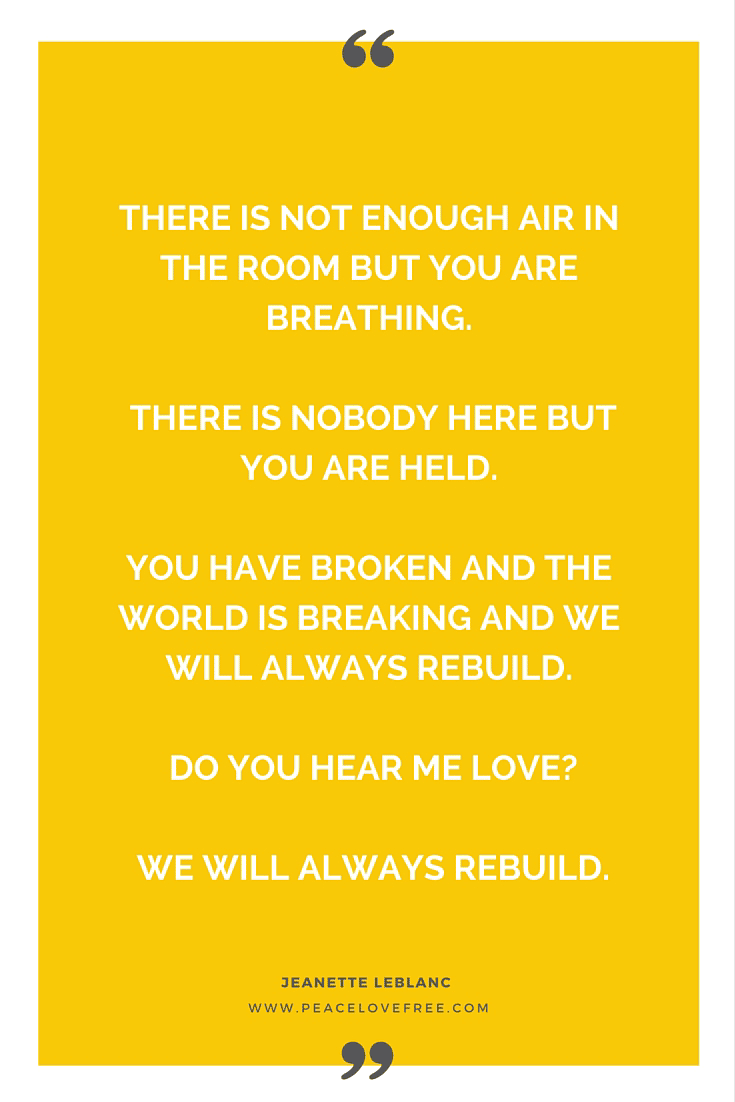 |
| Alan Sorrell: A Life Reconstructed |

(a poem for the grieving)
by Jeanette LeBlanc
You are here.
You are here.
Even though everything smells like love and loss and burning.
Start with this.
You are here and it hurts.
It hurts because of all you’ve lost.
Your heart is a 3am siren, driving through that sucker punch bruise of a night sky.
Never a sign of anything good.
Here, nothing feels good.
Now you’ve begun.
You are here and it hurts and the world feels impossibly heavy.
There is not enough air in the room.
The quilt on your bed is eight hundred pounds of weight keeping you from movement.
There is no going back
There is never any going back.
Now you’re getting somewhere.
You are here and it hurts and the world feels impossibly heavy and you are shouting bargains at the moon.
He is listening but does nothing.
There is nothing he can do.
You are on your knees in the grass,
clutching handfuls of earth.
This is progress.
You are here and it hurts and the world feels impossibly heavy and you are shouting bargains at the moon and there is nobody else to hear you
It is the darkest night you’ve ever lived through
You’ve lived through.
You’ve lived.
Do you hear me?
You live.
You make it.
You survive.
There is a faint tinge of light on the horizon and you made it.
Now we’re finally moving forward
You are here and it hurts and the world feels impossibly heavy and you are shouting bargains at the moon and there is nobody else to hear you and there is a grief wail building inside of you.
Through the earth, through your toes,
Your legs, your belly, your chest and lungs,
The reach of your arms, your curled fists.
Your neck
Your jaw
Your face
The top of your head.
Have you ever seen a building implode?
Yes. This is you.
Now you know you have begun the work of healing.
You are here and it hurts and the world feels impossibly heavy and you are shouting bargains at the moon and there is nobody else to hear you and there is a grief wail building inside of you and you crumbling.
The ground shakes as her own broken pieces slide rough against each other.
There is a red earth landslide and everything is tumbling into the sea.
On the ocean, a wall of water rushes toward land.
Disaster cannot be prevented, only survived or not.
The earth knows well the pain of things that cannot be fixed.
Your pain cannot be fixed.
There is no shortcut through this.
This knowledge is the key to everything that will come next.
There is more to come.
Sometimes healing looks like falling apart.
Sometimes falling apart is the path to what can be built.
Sometimes, we go through the darkest nights and there is nobody but the moon to hear.
He always listens.
Now you listen.
There is not enough air in the room but you are breathing.
There is nobody here but you are held.
You have broken and the world is breaking and we will always rebuild.
Do you hear me, love?
We will always rebuild.
- Jeanette LeBlanc






